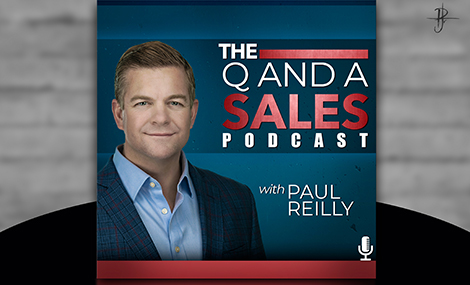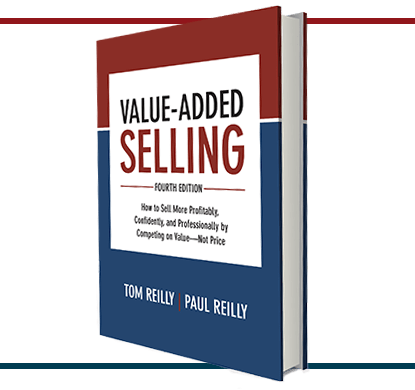In this episode, Paul shares his thoughts on motivating your sales team.
Show Notes:
Top-achieving salespeople are more motivated than they are talented. The key is to create an environment where your sales team can motivate themself.
Salespeople have a target to hit. Their job is to hit that target, whether it’s good times or bad times.
“People rise or fall to the expectations they are given. If you lower a salesperson’s target, they’re eventually going to live down to that expectation.”
Establish new activity targets to complement the achievement target. Activity-based targets will give salespeople something to accomplish.
While you’re coaching your team, focus on their behaviors and process, not their performance. The goal is to reinforce the behavior and the process that will lead to the results.
Click here to purchase the latest copy of Value-Added Selling!
Register for Andrea’s Launch Your Podcast class from The Creative Impostor Studios at http://www.thecreativeimpostor.com/qandalaunch.
This virtual training is Thursday, July 9th, 7:00 pm CST.
***
Our show is updated weekly with the questions you ask. So, please go to the home page, subscribe, share it with your friends, but most importantly, ask the question that you want answered.
The Q and A Sales Podcast is edited by The Creative Impostor Studios.
Thank you for tuning in. Make it a big day.
How do I motivate my sales team?
(Transcribed from podcast)
On today’s episode, we’re going to talk about motivation. Recently, I sat down with a couple of sales leaders, and their team is struggling. They’re struggling to hit their targets; they’re struggling to find new prospects, and it’s hard to keep them motivated. That’s what we’re going to talk about today: How do I keep my salespeople motivated? How do I motivate them even in these tough times, given the current situation? We’re going to share some insights and ideas on that.
Before we get into that, though, a quick shout-out to our sponsor, The Creative Impostor Studios. Podcasting is the next big thing in marketing. It’s a great way to connect with your audience. If you thought about starting a podcast, think about anything you want to start the podcast with: a hobby, an idea, a way to build your business. It’s a great way. So talk to Andrea. There’s going to be a link to her website on this episode’s webpage.
Also, make sure you pick up your latest edition of Value-Added Selling. Again, whether you’re a sales leader or a salesperson, this is going to be your go-to guide to go out there and sell more profitably by competing on value, not price.
With that said, let’s get started with today’s episode: How do I keep my salespeople motivated?
When we look at motivation, there are a couple things we need to remember: You have intrinsic and extrinsic motivation. True motivation happens internally. When you look at some of the top achievers, top performers, these individuals are more motivated than they are talented. And I actually did this—this was several months ago—I did a quick study. I was conducting it at a conference (when conferences still were happening). It was down in Dallas. And I took a poll question from the audience and I asked the group, “How would you describe your top-achieving salesperson? Are they more motivated than they are talented or are they more talented than they are motivated?”
Seventy percent, or nearly 70%… Sixty-nine percent said that they were more motivated than they are talented. So that goes to show you just how important motivation is. But motivation is something that happens inside out, not outside in. You can do your best to try to influence your salespeople, to help them, to motivate them. But really, it comes down to creating an environment where they can motivate themselves. So with that being said, we need to focus on what we can control, as a sales manager and a sales leader, to motivate our team or create that motivational environment.
The first thing we’re going to do is look at our targets. I want to be clear here. Salespeople are given a target, and their job is to go out there and hit that target. Whether it’s good times, whether it’s tough times, whatever it might be, their goal is to hit that target. I’m not suggesting that we soften the target, even if the economy is tanking, even in the midst of a crisis. No. We want to aim high because people rise or fall to the expectation that they’re given. As soon as we start lowering their expectation, they might just live down to those expectations. We want to keep a high level of expectation, but we want to establish some new targets along the way.
Think about this, during tough times, it’s more challenging to hit targets. And if you look at what happens during recessions, things like that, fewer salespeople will hit their targets. Some people are still going to hit them. Some are going to absolutely thrive. But the chances are, people are going to hit their targets less. So we need to give them something to achieve. That’s why, during tough times, I encourage sales leaders to establish new types of targets; targets that focus more on activity versus achievement. Again, I’m not saying you get rid of the target that you’ve already set for them, but you want to set some new targets to compliment the original one.
One thing I would do, I would recommend setting activity-level targets where they’re expected to hit X number of prospects per day, make X number of calls, schedule X number of meetings. These activity-based targets will give them something to aim for; something that they can accomplish. It’s going to give them a sense of accomplishment. It’s also going to motivate them and keep them moving forward.
Now, as you’re setting these new activity-based targets, I would incorporate their feedback. When it comes to goal setting, remember, when you bring someone into the conversation, like your sales people, and you ask them, “Hey, we’re going to set some new targets. What do you think would be a good number, a good target for your activity level?” Number of calls per day, number of prospects, things like that. Get them involved in the process. What’s going to happen? You’re invoking the endowment effect. We’ve talked about this on previous episodes. The endowment effect basically means that people place a higher value on the things that they own versus the things that they don’t. And if your salespeople are a part of the process of setting their targets, they’re now going to own it. And if they own it, they’re more likely to go after it. That’s also going to help motivate them. Just a couple of thoughts on setting targets.
The next thing we want to do… we want to tap into their deeper motivation. I don’t care what you’re selling; I don’t care what your profession is, but some of the most successful (sales)people that I’ve met in my career have a deeper purpose in what they’re doing. So for us, as sales leaders, our goal is not to push our purpose on them, not to push our company mission statement on them. Our goal is to figure out what their individual purpose is—why they’re doing what they’re doing. If we can dive deeper into that and we can understand that, then we can connect their deeper purpose to what they’re doing every single day. That’s going to help them feel more motivated, more engaged in what they’re doing.
So I would have that conversation with your salespeople and just say, “Hey, why are you in sales?” And just have a conversation. Use it as a starting point. Your goal is to try to dig deeper into what their actual purpose is because that deeper purpose will help drive them. Finding that deeper purpose is going to motivate them at a deeper level. And helping them find that, and then tie that to what their daily activities are… they’re going to be able to manage these tough times with a much better attitude and more motivated. So help them find that purpose. Ask them questions. Have a conversation.
Next thing, give them some autonomy. With sales, it’s such a great profession because you’re given a lot of freedom. And typically, in a sales position, you’re not reporting into an office every day. You’re out there meeting with customers, clients. You have a lot of freedom already. Over the past several months, it feels like salespeople have less control. So we’ve got to realize that that is probably affecting them, not only at a performance level, but also at a mental level. They used to have a lot more control. The last thing we want to do is put a bunch of controls and restraints on our salesforce. Make sure you’re giving them the autonomy that they need to go out there and actually achieve their objective. So give them some autonomy, make sure that they have a certain level of freedom in what they’re doing. And realize that maybe your way is the sales manager, right? How you were successful in sales might not be the way that they’re going to be successful in sales. We have to realize that. And also, we have to give them that level of autonomy.
Next thing… Just a couple of tips in the way of creating a motivational environment. It’s important that we coach them up during these tough times. Getting out there with them, either on some joint calls, via zoom or joint calls with clients (if you’re able to go visit with them), make some joint calls. Look for some coaching opportunities to help them. And while you’re out there, reinforce the behavior, not necessarily the results. When you reinforce the right behavior, it’s going to encourage your people to continue to do the right thing. So get out there in the field with them. Coach them up a little bit.
One last thought, and we kind of hinted at this already: When you are coaching them up focus on the process, not necessarily the performance. With tough times, we can’t control whether people buy or not. But what we can control is our effort, our attitude, our energy that we put into it. We can control the process that we follow. So as your salespeople are out there and they are trying to sell; they’re trying to bring in that new prospect, whatever it might be, focus on their activity, their behavior, the process that they’re following. And that’s where we coach them up. By focusing on the process, it’s going to encourage the right behavior that will eventually lead to those results.
Those are just a few tips for all my sales managers/sales leaders out there. Again, motivating your sales team is something that happens inside out. Our job is to create a motivational environment for them.
Make it a big day.


